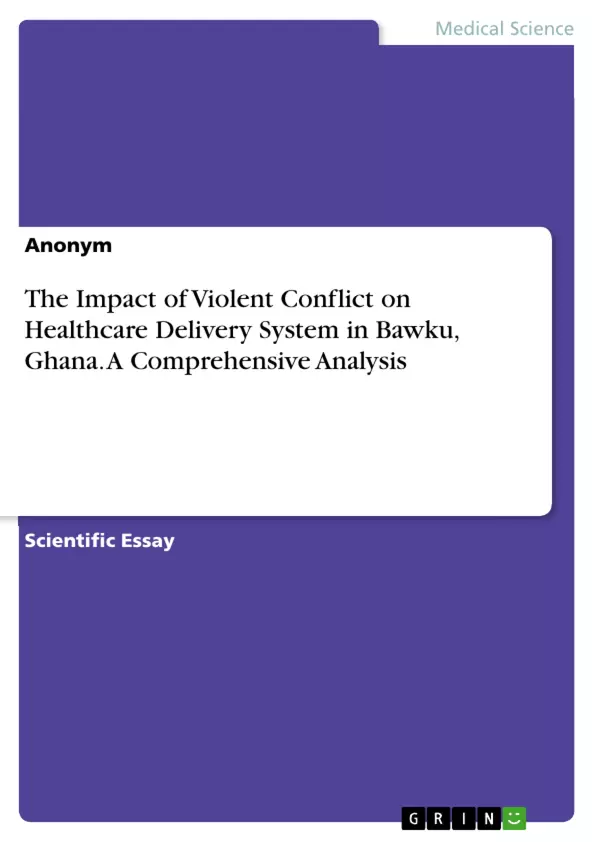Violent conflicts exert profound ramifications on healthcare delivery, particularly evident in conflict-stricken areas such as Bawku, Ghana. This research employs a mixed-methods approach to comprehensively explore the repercussions of violent conflict on the healthcare system in Bawku.
Structured surveys, in-depth interviews, and focus group discussions were conducted with healthcare personnel, local authorities, and community members, totaling 150 participants. The study reveals distressing damage to healthcare infrastructure, including diagnostic instruments and surgical tools, rendering them non-functional, thus impairing precise diagnoses, interventions, and patient monitoring. The conflict's impact extends to utility availability, with electricity, water supply, and sanitation systems severely compromised, exacerbating healthcare challenges. The interconnectedness of healthcare components further magnifies the impact. Beyond compromising physical health, conflicts erode trust in healthcare systems. Despite limitations, this research underscores the urgency of addressing these challenges to secure community well-being and sustain healthcare accessibility in conflict affected regions.
Table of Contents
- Abstract
- 1. Introduction
- 2. Literature Review
- 2.1 Brief history of conflicts in Ghana, with a focus on Bawku
Objectives and Key Themes
This research employs a mixed-methods approach to explore the repercussions of violent conflict on the healthcare system in Bawku, Ghana. The main objective is to assess the extent of damage caused by violent conflicts to healthcare infrastructure and utilities.
- Impact of violent conflict on healthcare infrastructure in Bawku.
- Disruption of healthcare services due to conflict.
- Effects of conflict on access to healthcare and the well-being of the population.
- The role of historical ethnic tensions and resource competition in perpetuating conflict.
- Challenges in providing adequate healthcare in conflict-affected regions.
Chapter Summaries
Abstract: This study investigates the impact of violent conflict on healthcare delivery in Bawku, Ghana, using a mixed-methods approach. It reveals significant damage to infrastructure, utility disruptions, and erosion of trust in healthcare systems.
Chapter 1: Introduction: This chapter provides background information on conflict, its various forms, and the devastating consequences of violent conflict on healthcare. It highlights the vulnerability of healthcare delivery systems in conflict-affected areas and the violation of human rights and international humanitarian law associated with attacks on healthcare.
Chapter 2: Literature Review: This section briefly details the history of conflicts in Ghana, specifically focusing on the protracted conflict in Bawku. It delves into the historical roots of the conflict, involving the Kusasis and Mamprusis ethnic groups, and the various attempts made to resolve the conflict through traditional mechanisms and state intervention.
Keywords
Violent conflicts, healthcare delivery, healthcare infrastructure, utility availability, Bawku, Ghana, ethnic conflict, resource competition, healthcare access, public health, conflict resolution.
- Quote paper
- Anonym (Author), 2023, The Impact of Violent Conflict on Healthcare Delivery System in Bawku, Ghana. A Comprehensive Analysis, Munich, GRIN Verlag, https://www.grin.com/document/1490759



